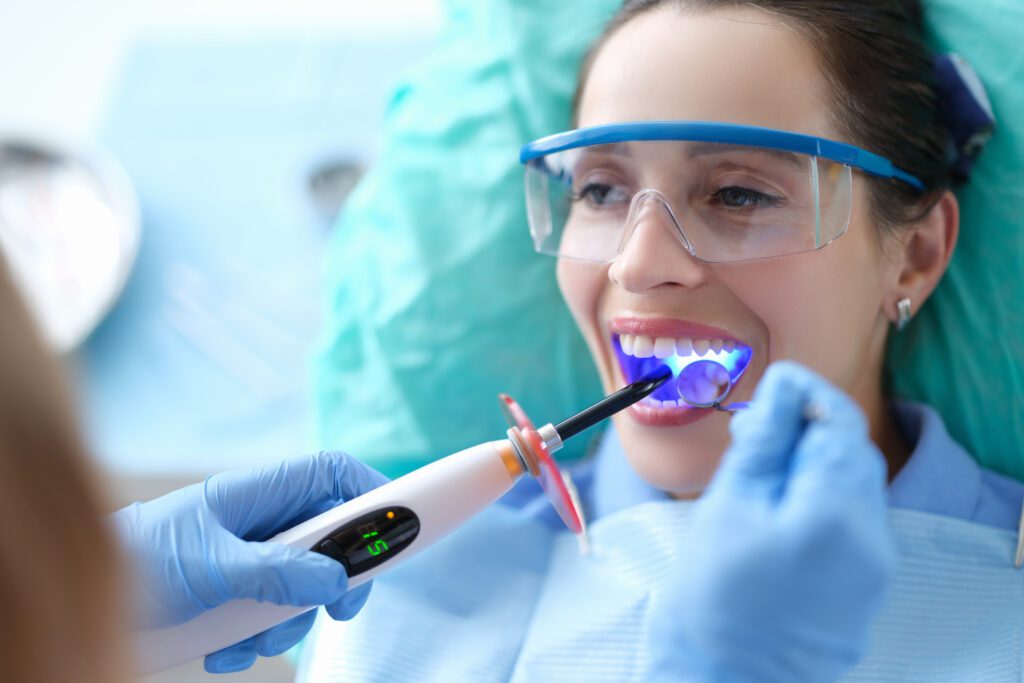Do you have a broken or chipped tooth? Are you looking for a way to cover one or more damaged or stained teeth? Dental bonding can help. Bonding uses malleable materials to cover imperfections and create small changes in the smile.
Dr. Jordan Morris offers this cosmetic dental treatment to patients with tooth gaps, chipped teeth, tooth cracks, and shortened teeth. Dental bonding is a great economical option if you are interested in treatments like dental veneers but want to address smaller cosmetic problems.

Teeth Bonding Treatment in Sahuarita, AZ
Dental bonding treatment uses composite materials to cover and add structure to teeth. Composite resin is a tooth-colored material that we can color-match to existing teeth. To begin dental bonding treatment, Dr. Morris uses a shade guide to determine the best shade to add to the treated tooth.
Then, he roughens the tooth and applies a conditioning liquid to ensure the bonding material adheres to the tooth’s surface. Dr. Morris will mold the composite material into the perfect shape. Then, he bonds the resin to the tooth using a high-intensity curing light. Finally, he trims, shapes, and polishes the bonded tooth.
How Do I Care for Bonded Teeth?
After bonding treatment, avoid foods and drinks that typically stain teeth, like berries, tomatoes, coffee, tea, and wine. Additionally, avoid smoking or tobacco products. As you get accustomed to your veneers, avoid hard or crunchy foods. You can brush and floss between bonded teeth just like natural teeth.
When brushing, use non-abrasive toothpaste and a soft-bristled toothbrush. Remember to visit Dr. Morris twice yearly or every six months for a dental cleaning and exam. He will also ensure that our bonded teeth continue to look and feel natural.
Frequently Asked Questions
Will having bonded teeth affect future dental procedures?
Dental bonding generally doesn’t affect most future dental procedures. However, if the bonded area requires further treatment, the resin may need to be removed and reapplied. For extensive procedures like crowns or veneers, the bonding material may need to be adjusted or replaced.
Does insurance cover dental bonding?
Dental bonding may be covered by insurance if it’s done for medical reasons, like repairing a chipped or decayed tooth. If it’s solely for cosmetic purposes, it’s less likely to be covered. Check with your insurance provider to confirm coverage details.
Will bonded teeth look natural?
Yes, bonded teeth can look very natural. The resin is color-matched to blend with your natural teeth, and the dentist shapes and polishes it for a seamless appearance. When done by an experienced dentist, it’s difficult to tell the difference between bonded and natural teeth.
Do teeth rot under bonding?
No, teeth do not rot under bonding if the resin is applied correctly and oral hygiene is maintained. However, decay can still occur if bacteria accumulates around the edges of the bonded area. Brushing, flossing, and regular dental visits are essential to keeping bonded teeth healthy.
Do they shave your teeth for bonding?
No, shaving or extensive enamel removal is not usually required for bonding. The dentist may lightly roughen the tooth’s surface to help the resin adhere better. This makes bonding a minimally invasive and reversible procedure
How many times can a tooth be bonded?
A tooth can be bonded multiple times, but each repair depends on its condition and the amount of structure remaining. Over time, the resin may need replacement due to wear or damage. If the tooth becomes too compromised, other treatments, like a crown, may be recommended.
Is dental bonding good for receding gums?
Dental bonding can be used to cover exposed roots caused by receding gums. It protects the tooth from sensitivity and improves its appearance. However, it’s a cosmetic solution and doesn’t treat the underlying cause of gum recession, so addressing the root issue is important.
Call Our Office For Bonding Treatment
Do you want to treat small cosmetic problems like chipped or stained teeth? Ask us about treatment with dental bonding. Contact Dr. Morris for dental bonding treatment today by calling 520-412-9162. You may also schedule your next dental visit on our website. Let Dr. Morris know if you have questions about the treatment process or your candidacy for care.
